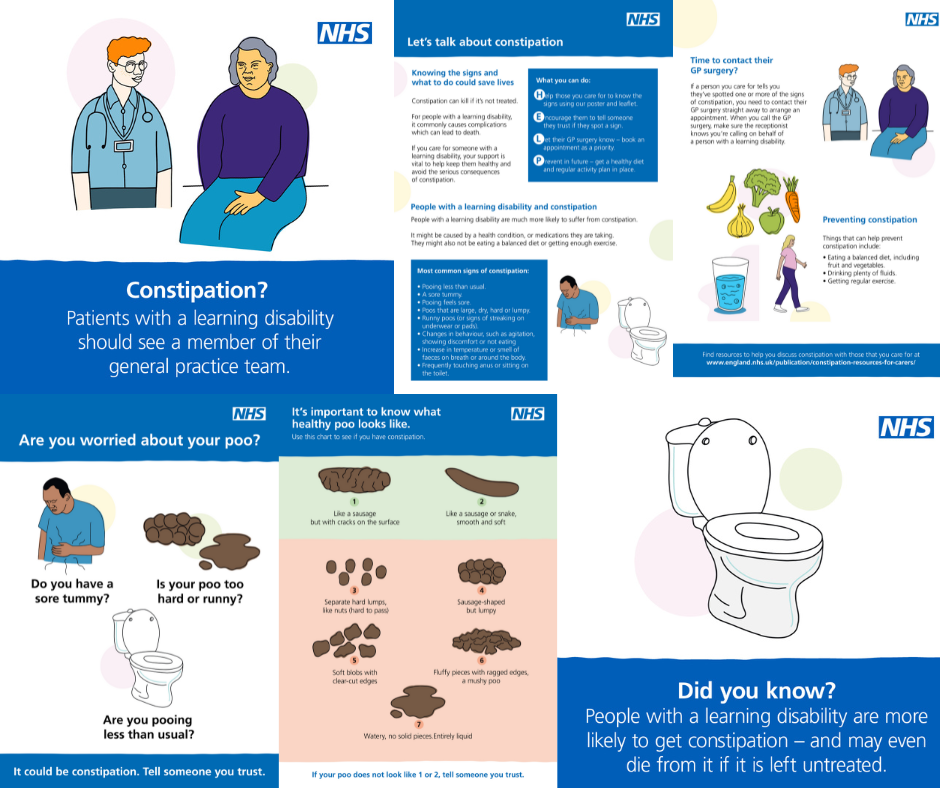Gastrointestinal & Diabetes
Some gastrointestinal conditions are more common in people who have Down’s syndrome. Children who have Down’s syndrome may be more susceptible to digestive difficulties such as reflux, diarrhoea and constipation. Whilst constipation is common in children who have Down’s syndrome, in most cases it is not due to any underlying bowel condition and can be managed as it would be in any child. If constipation is present since birth, or is severe and persists despite simple measures, then discuss your concerns with your doctor.

About Gastrointestinal Conditions
Some gastrointestinal conditions will have obvious symptoms such as diarrhoea and vomiting but people may also have more subtle symptoms that could be overlooked. People who have Down’s syndrome may not be able to recognise or tell you about their symptoms. Changes in behaviour, routines (including frequency of toilet use and increased time spent using the toilet) and appetite may indicate there is an issue.
If a person who has Down’s syndrome is showing any signs that worry you, make sure they have a thorough check-up by their doctor. You should always expect health professionals to take your concerns seriously and carry out proper investigations. There is further information about gastrointestinal conditions in our resources linked to below.
Although Coeliac disease (sensitivity to a protein in wheat, called gluten) can occur more frequently in people who have Down’s syndrome, routine screening is currently not recommended.
Symptoms of Coeliac disease include bowel problems, tiredness or a change in behaviour. There should be a low threshold for checking for Coeliac disease and, if the person you support has symptoms seek advice from your doctor.
There is more in-depth information about Coeliac’s disease here:
The gastrointestinal tract comprises the parts of the body involved in taking in food, processing it to make use of the nutrients and disposing of the solid waste. It includes the mouth, the oesophagus, stomach, small intestines or bowel (duodenum, jejunum, ileum), the large intestines (colon, rectum) and the anus. The liver and pancreas are attached to the gastrointestinal tract and produce enzymes which help with the digestion of food.
Problems with the gastrointestinal tract can be due to organs developing differently and/or because part of the tract is not functioning properly. These problems can be present at birth or they can develop as a person gets older.
Diabetes
Type 1 diabetes is more common in people who have Down’s syndrome. This is a condition where the immune system attacks and destroys the insulin producing cells in the pancreas. Children who have Down’s syndrome tend to develop diabetes earlier than other children in the general population.
It is managed with regular blood monitoring and insulin injections.With modern pen injectors this is quite easy. Many people who have Down’s syndrome learn to administer insulin themselves, as part of their daily routine. Some people who have Down’s syndrome will develop type 2 diabetes.This is a condition where the pancreas does not produce enough insulin to meet the body’s needs or the insulin is not used effectively by the body’s cells.
It is often associated with growing older and being overweight. However, type 2 diabetes is now being found in children in the general population. A USA clinic for people who have Down’s syndrome has reported seeing a 15-year-old patient with type 2 diabetes. It is usually managed through lifestyle changes such as exercise and changes in diet. Medication and insulin may also be prescribed.
The symptoms of diabetes may be subtle and come on gradually. People may not be able to recognise or tell you about their symptoms. Behaviour changes may indicate that something is wrong for the person you support. These are some of the main symptoms of diabetes to look out for:
- Increased thirst (polydipsia)
- Passing urine more often – especially at night (polyuria)
- Extreme tiredness
- Weight loss (in Type 1 diabetes)
- Blurred vision
See our diabetes resource below for further information. If you have concerns about diabetes and the person you support, make an appointment with their doctor.
Further Info & Advice
If you have any questions about health issues, you can call DSA’s Helpline (Tel: 0333 1212 300) or email using info@downs-syndrome.org.uk. If an information officer is unable to answer your question, they can make a referral to the medical adviser at the UK & Ireland Down Syndrome Medical Interest Group (DSMIG).
Please note DSMIG can provide general advice about health issues but they are not able to comment on individual test results. DSMIG are happy to take enquiries from health professionals but they will not take direct from enquiries from families or supporters.
Resources and useful organisations
Down’s Syndrome Association
Other
Bowel and Bladder UK
Resources for supporters and schools about Hirschsprung’s disease, constipation and anorectal malformation.
Coeliac UK
Information about living gluten free.
LeDeR NHS resources on constipation
In 2023, the Our Voice network contributed to the development of set of resources to help prevent, recognise and treat constipation in people with a learning disability.
There are resources that can printed and used in home or care settings, for people who have learning disabilities and their carers/supporters.

Books Beyond Words
Resources for people who have learning disabilities.
Diabetes UK
Resources for health practitioners supporting patients with diabetes who have learning disabilities and people who have learning disabilities.
